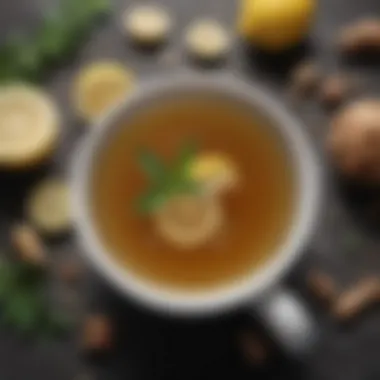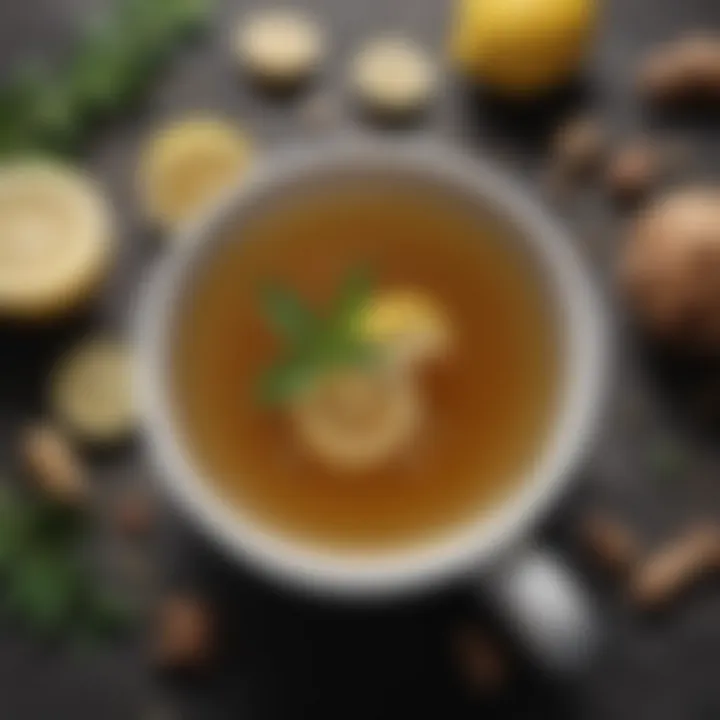Effective Strategies to Combat and Alleviate Common Cold Symptoms Quickly


Insider Health Tips
When battling a cold, it is crucial to take care of your health from the inside out. Incorporating a balanced diet rich in vitamins and minerals will help boost your immune system, aiding in a quicker recovery. Consuming foods high in antioxidants, such as citrus fruits and leafy greens, can provide essential nutrients that your body needs to fight off the common cold. Additionally, staying hydrated by drinking plenty of water will help flush out toxins and keep your body functioning optimally.
Natural Remedies
Natural remedies can be effective in alleviating cold symptoms and speeding up the recovery process. Herbal teas, such as ginger and chamomile, can help soothe a sore throat and reduce inflammation. Honey has antibacterial properties that can help relieve coughing, while steam inhalation with eucalyptus oil can clear nasal congestion. Incorporating these natural remedies into your routine can provide comfort and relief while your body fights off the cold virus.
Rest and Relaxation
Rest is essential when trying to get rid of a cold quickly. Giving your body time to recuperate and heal is paramount in expediting the recovery process. Make sure to get plenty of sleep to allow your immune system to work efficiently in combating the virus. Stress management techniques, such as deep breathing exercises or meditation, can also help reduce inflammation and promote overall wellness. By prioritizing rest and relaxation, you give your body the best chance at overcoming the cold swiftly.
Professional Consultation
If your cold symptoms persist or worsen, seeking professional medical advice is imperative. A healthcare provider can offer proper diagnosis and recommend appropriate treatment options tailored to your specific condition. Whether it's over-the-counter medications, prescribed antiviral drugs, or other medical interventions, consulting a healthcare professional ensures that you receive the best possible care for your cold. Remember, your health is paramount, and seeking expert guidance can help you recover effectively and safely.
Understanding the Common Cold
In this segment, we delve into the significance of comprehending the common cold within the context of holistic health and well-being. Understanding the common cold goes beyond the surface symptoms, offering a glimpse into the intricate workings of our immune system and how external factors can trigger this viral infection. By grasping the underlying mechanisms of the common cold, individuals can make informed decisions regarding prevention and treatment approaches. This knowledge empowers individuals to take proactive steps in managing their health more effectively.
What Causes a Cold?
To comprehend what causes a cold, we need to navigate through the realm of viral infections. The common cold is typically caused by a group of viruses known as rhinoviruses. These tiny agents of contagion thrive in environments where people are in close proximity, making transmission inevitable. When a person comes into contact with these viruses, particularly through respiratory droplets, the journey towards a cold begins. Factors such as a weakened immune system or exposure to cold temperatures can exacerbate the likelihood of catching a cold.


Symptoms of a Cold
The symptoms of a cold present themselves as a relentless orchestra of discomfort. From a persistent runny nose to a scratchy throat and bouts of sneezing, the body's response to the cold virus can be quite challenging. Understanding these symptoms is crucial for differential diagnosis, as they can often overlap with other respiratory conditions. Being able to identify the hallmark signs of a cold enables individuals to seek appropriate remedies and prevent the spread of the virus to others.
Duration of a Cold
The duration of a cold can vary from person to person, influenced by factors such as immune response, viral load, and overall health. Generally, a cold can last anywhere from a few days to a couple of weeks. The body's immune system works tirelessly to combat the virus, gradually reducing symptoms over time. However, certain complications or underlying health conditions can prolong the duration of a cold. Monitoring the progression of symptoms and seeking medical advice when necessary are essential steps in navigating through the timeline of a common cold.
Immediate Actions to Take
In the journey to combat a common cold swiftly, taking immediate actions plays a pivotal role. These quick interventions can help alleviate symptoms and potentially shorten the duration of the cold. One of the fundamental steps to initiate is staying hydrated. By consuming ample fluids, particularly water, you can help thin mucus and keep your throat moist, aiding in the relief of congestion and sore throat. Rest and relaxation are also crucial during this period. Allowing your body adequate time to recuperate can bolster your immune system's ability to fight off the cold virus efficiently. Simultaneously, gargling with warm salt water can provide relief for a sore throat, reducing inflammation and discomfort. This simple yet effective remedy can help in loosening mucus and minimizing the severity of symptoms. Additionally, incorporating the use of a humidifier in your immediate action plan can offer comfort by adding moisture to the air, aiding in alleviating congestion and soothing irritated nasal passages. By integrating these practical measures promptly, you can kickstart your journey towards a speedier recovery.
Stay Hydrated
Hydration stands as a cornerstone in the quest to combat a cold quickly and effectively. Ensuring adequate intake of fluids, especially water, is vital in managing the symptoms associated with a cold. The consumption of liquids helps in thinning mucus, facilitating easier expulsion from the body. Additionally, ample hydration aids in maintaining mucous membrane hydration, enhancing its ability to combat viruses and irritants. This simple yet often overlooked step can make a significant difference in the severity and duration of a cold. Incorporating electrolyte-rich beverages or warm fluids can offer additional comfort and relief, supporting the body's immune response throughout the recovery process.
Rest and Relaxation
Amid battling a cold, prioritizing rest and relaxation is paramount for a swift recovery. Adequate rest allows the body to conserve energy and direct resources towards combating the viral infection. Engaging in activities that promote relaxation, such as deep breathing exercises or gentle stretches, can further aid in reducing stress levels and boosting immune function. By giving yourself permission to rest, you provide your body with the necessary conditions to recuperate efficiently. Embracing this holistic approach not only aids in symptom alleviation but also supports overall well-being during the recovery period.
Gargle with Warm Salt Water
Gargling with warm salt water proves to be a time-honored remedy for soothing a sore throat and reducing inflammation. The saline solution works by drawing excess fluid from inflamed tissues, resulting in decreased swelling and discomfort. Additionally, the antimicrobial properties of salt can help fend off bacteria and viruses, offering relief from throat irritation. This simple and cost-effective intervention can be performed multiple times a day to maintain throat comfort and promote healing. Including this practice in your cold management regimen can contribute significantly to symptom relief and overall comfort.


Use a Humidifier
Integrating a humidifier into your healing routine can enhance comfort and aid in symptom management during a cold. By releasing moisture into the air, a humidifier helps in loosening congestion and soothing irritated nasal passages. This device creates an optimal environment for respiratory health by preventing airway dryness and reducing nasal irritation. Whether opting for a cool or warm mist humidifier, the added moisture can alleviate coughing, promote easier breathing, and enhance overall comfort. When used in conjunction with other cold remedies, a humidifier can expedite the recovery process and minimize discomfort associated with respiratory symptoms.
Natural Remedies for Fast Relief
In the quest to swiftly eliminate a common cold, exploring natural remedies proves to be a pivotal aspect. Embracing these remedies not only aids in combating the symptoms but also contributes to overall well-being. The emphasis on natural remedies stems from their gentle yet effective nature, steering clear of harsh chemicals commonly found in medications. This approach aligns with a holistic perspective on health, promoting the body's innate ability to heal itself. Individuals seeking fast relief from a cold often turn to natural solutions as a safer alternative with fewer side effects. Additionally, natural remedies offer a diverse range of options, catering to various preferences and requirements. The consideration of one's holistic health and well-being underscores the importance of incorporating natural remedies into the treatment plan.
Chicken Soup
Chicken soup stands as a time-honored remedy for alleviating cold symptoms. This warm and comforting broth not only provides hydration but also delivers essential nutrients to support the immune system. The steam rising from a bowl of chicken soup helps clear nasal passages, reducing congestion and making breathing easier. Its easy digestibility makes it a suitable choice even when appetite diminishes during illness. The inclusion of ingredients like chicken, vegetables, and herbs enhances the nutritional value of the soup, delivering a nourishing and healing boost to the body. Whether homemade or store-bought, chicken soup remains a go-to remedy for combating a cold and promoting recovery.
Echinacea
Echinacea, a popular herb known for its immune-boosting properties, serves as a go-to remedy for fast relief from cold symptoms. With its potential to reduce the duration of a cold and alleviate its severity, echinacea has garnered attention for its therapeutic benefits. This herb stimulates the immune system, helping the body ward off infections and recover more swiftly. Echinacea is available in various forms, including teas, supplements, and tinctures, offering flexibility in consumption. Embracing echinacea as a natural remedy empowers individuals to enhance their immune response and combat cold symptoms with a plant-based ally.
Honey and Lemon
The combination of honey and lemon emerges as a soothing and effective remedy for cold symptoms. Honey's antimicrobial properties help soothe a sore throat and suppress coughing, promoting greater comfort during illness. Lemon, rich in vitamin C, acts as a natural immune booster, aiding the body in fighting off the cold virus. When mixed together, honey and lemon create a synergistic blend that not only tastes pleasant but also delivers a potent dose of nutrients and healing compounds. Enjoyed as a warm drink or added to teas, honey and lemon form a natural and flavorful remedy for quick relief from a cold.
Garlic
Garlic, known for its antimicrobial and immune-boosting properties, emerges as a powerful natural remedy for combating a cold. Allicin, a compound found in garlic, exhibits antiviral and antibacterial effects, making it a valuable ally during illness. Incorporating raw garlic into meals or consuming garlic supplements can help shorten the duration of a cold and alleviate its symptoms. The pungent flavor of garlic signifies its potent healing potential, acting as a natural antibiotic to support the body's defenses. By harnessing the therapeutic benefits of garlic, individuals can accelerate the recovery process and get back to optimal health sooner.


Over-the-Counter Remedies
In the realm of combating a cold, over-the-counter remedies play a pivotal role in alleviating symptoms and expediting recovery. These medications, easily accessible without a prescription, offer a range of benefits that are crucial in managing the effects of a cold. From decongestants to pain relievers and cough suppressants, over-the-counter options provide relief for various symptoms that accompany the common cold. One key advantage of over-the-counter remedies is their convenience; they can be swiftly obtained from local pharmacies or stores, making them a practical choice for individuals seeking immediate relief from cold symptoms.
Decongestants
Decongestants are an essential component of over-the-counter remedies for colds, targeting nasal congestion to improve breathing and overall comfort. These medications work by reducing the swelling of blood vessels in the nasal passages, relieving congestion and enhancing airflow. When used as directed, decongestants can effectively alleviate stuffiness and pressure in the sinuses, allowing individuals to breathe more easily. It is important to note that decongestants come in various forms, including tablets, nasal sprays, and liquids, each with its own set of considerations and potential side effects. Before using decongestants, it is advisable to consult with a healthcare professional to determine the most suitable option based on individual health needs and existing medications.
Pain Relievers
Pain relievers are another crucial aspect of over-the-counter remedies for colds, addressing common symptoms such as headaches, sore throat, and body aches. These medications help reduce fever and alleviate discomfort, enabling individuals to manage the pain associated with colds more effectively. Ibuprofen, acetaminophen, and aspirin are commonly used pain relievers that can provide relief from the aches and pains that often accompany a cold. It is essential to follow the recommended dosage instructions when taking pain relievers and to be aware of any potential interactions with other medications. Additionally, consulting a healthcare provider can help determine the most appropriate pain reliever based on individual health conditions and medical history.
Cough Suppressants
Cough suppressants are integral to over-the-counter remedies for colds, targeting coughs that persist and disrupt daily activities. These medications work by suppressing the urge to cough, allowing individuals to experience relief from persistent coughing fits. By soothing the throat and reducing the frequency of coughing, suppressants help individuals rest and recover more effectively. Common ingredients in cough suppressants include dextromethorphan and codeine, each with its own considerations and potential side effects. It is advisable to use cough suppressants as directed and to seek guidance from a healthcare professional if symptoms persist or worsen.
Lifestyle Tips for Recovery
In the realm of battling a cold, post-recovery activities play a pivotal role in restoring health. Lifestyle tips can significantly influence the speed of recovery and reduce the risk of complications. After the acute phase of a cold passes, the body requires adequate rest and nourishment to rebuild its immune defenses and fully bounce back. Implementing effective lifestyle habits can fortify the immune system and prevent future illness episodes. From dietary choices to daily routines, every aspect of one's lifestyle impacts health outcomes.
Avoid Smoking
Smoking and exposure to secondhand smoke can exacerbate cold symptoms and prolong recovery time. The toxic chemicals in cigarette smoke compromise the respiratory system, making it harder for the body to fight off infections. Quitting smoking or avoiding exposure to smoke during a cold is essential for the immune system to function optimally. Eliminating smoking during illness aids in faster healing and reduces the risk of developing complications such as bronchitis or pneumonia.
Maintain a Healthy Diet
A balanced and nutrient-rich diet is crucial for supporting the immune system during a cold. Consuming a variety of fruits, vegetables, whole grains, and lean proteins provides essential vitamins and minerals that aid in recovery. Vitamin C and zinc have been linked to reducing the severity and duration of cold symptoms. Hydration is also key in maintaining mucus membrane health and supporting the body's natural defense mechanisms. Avoiding processed foods and excessive sugar intake helps prevent inflammation and supports overall immune function.
Practice Good Hygiene
Practicing good hygiene is paramount in preventing the spread of the cold virus and aiding in a speedy recovery. Regular handwashing with soap and water reduces the transmission of germs that cause colds. Proper respiratory etiquette, such as covering the mouth and nose when coughing or sneezing, helps contain the virus and prevent its spread to others. Disinfecting commonly touched surfaces like doorknobs, phones, and tabletops can further minimize the risk of reinfection. Good hygiene practices not only protect the individual but also safeguard against infecting others in close proximity.







